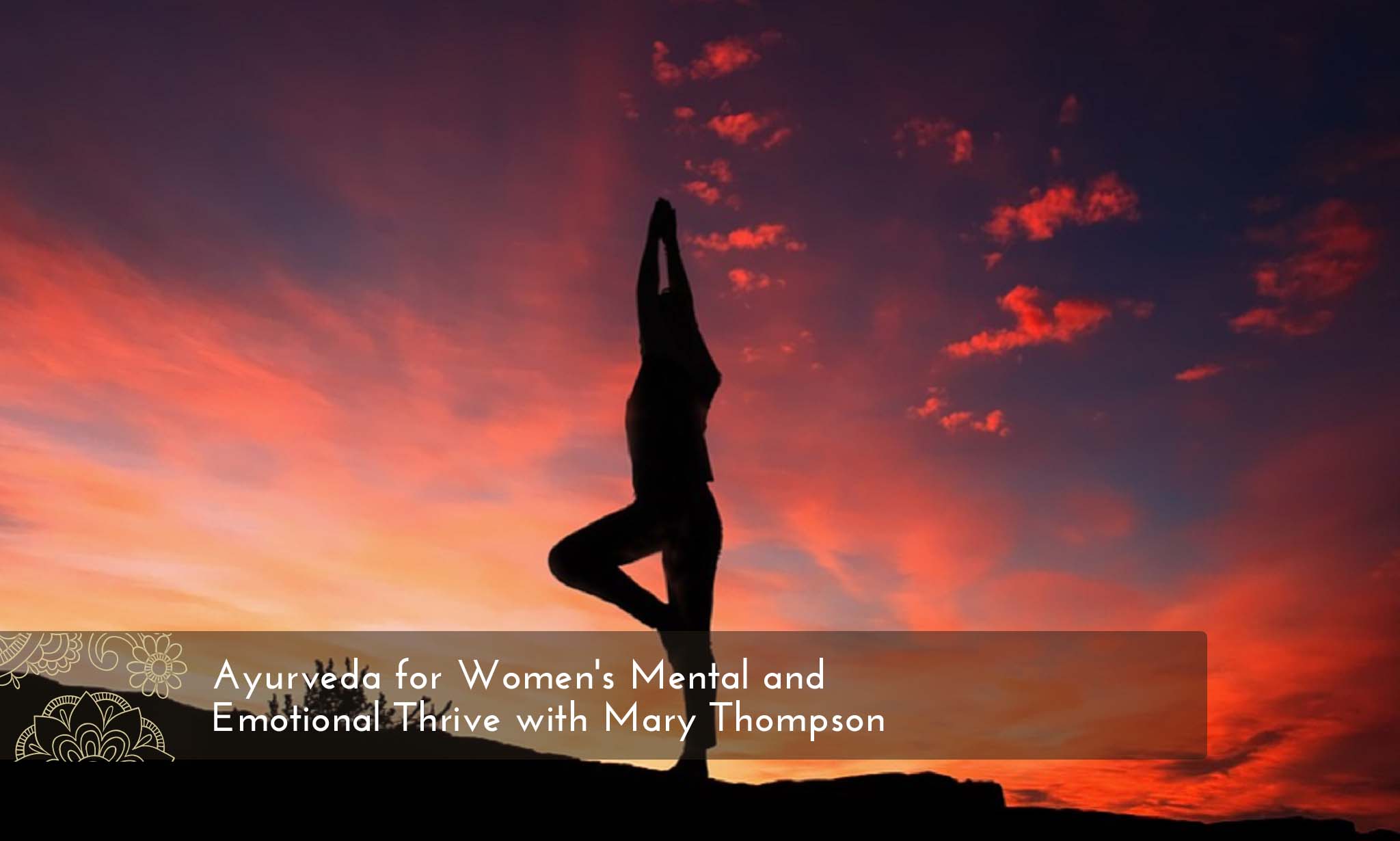Ayurveda for Women’s Mental and Emotional Thrive with Mary Thompson
Surround yourself with the people who remind you more of your future than your past.”
-Dan Sullivan of Strategic Coach
Mary Thompson is an internationally recognized leader in Ayurveda education. Along with being Cate’s first teacher at the California College of Ayurveda, Mary has also shared her vast knowledge with hundreds of other Ayurvedic Practitioners in training. She brings her unique insight into mental health issues through an Ayurvedic lens, asserting that psychological problems — including anxiety, frustration, and depression — originate from a person’s biorhythms being out of sync.
Although you’ll likely feel it when your biorhythms are out of sync, you might not recognize it because you’ve become accustomed to living in this unbalanced way. As women, our hormones also tend to vary with different times of the month and different stages of our lives. By taking the time to invest in your mental and emotional health, and by following Mary’s tips for emotional thrive, you can learn to react positively in different situations, balance your hormones and emotions, and create a better menstrual or menopausal experience.
Mary’s tips and techniques can help you recalibrate and begin living in mental and emotional thrive.
Taking Action for Mental and Emotional Thrive
In Ayurveda, psychological problems start when fundamental imbalances develop in the biological intelligence that controls all our bodily processes. Most illnesses, including anxiety and depression, begin when our doshas accumulate and disrupt our bodies’ delicate biochemistry — and throw us out of thrive. Often, we try to put other people first and bottle up negative energy so that we don’t inconvenience or offend anyone. This usually builds until it comes through in bursts of emotion, whether that’s frustration, anxiety, sadness, or anger.
Techniques for Positive Mental and Emotional Reactions
When we bottle up negative emotions, we can’t process and release them in a healthy way. It’s all too common that those emotions affect our responses to important people in our lives. However, by understanding emotional processing and reaction, you can learn how to redirect your energy to create positive situations for yourself and your loved ones.
 Stream-of-consciousness journaling
Stream-of-consciousness journaling
To start, simply sit down and begin writing. Let whatever needs to come out flow out onto the page. By doing this, you can process your persisting emotions through your physical body and move them out through the simple act of writing. Freeing yourself from your emotional history will allow you to discover your mental and emotional state. From there, you can move forward in healing.
Respond from your present moment rather than your history
After you’ve discovered your emotional history through writing, it’s time to let go of those lingering past feelings. Moving forward can help you become much more aware of how these accumulated emotions affect your present mood and actions. By doing this, it’s much easier to react to life events based on what’s currently happening, rather than what’s been building up inside you.
 Stop. Breathe.
Stop. Breathe.
When you find yourself reacting to past emotions rather than the present moment, pause and bring yourself into present-moment awareness. Stop what you’re doing and ask yourself, “Is there a different way I could respond to this?” When you feel a negative emotion, breathe into it to allow it to go into the thinking portion of your brain. There, you can analyze the different tools you have at your disposal to react to your situation and make it an opportunity, rather than a problem.
Hormone Imbalances and the Three Pillars
As women, we can feel our hormones shift and change throughout the month and throughout our stages of life. Instead of being a slave to your hormones, balance these three pillars of health, and your hormones can naturally fall into the right rhythm.
- Food: Prepare your own food, sit down for meals, and eat what nourishes your body and mind. When you balance what and how you eat, you’ll balance your hormones and emotions.
- Sleep: Do you feel tired in the morning because you haven’t gotten enough sleep? Do you feel groggy because you’ve gotten too much sleep? Balance your sleep patterns, and find out how much or how little sleep your body needs to feel alert, not groggy. Try going to bed a little earlier each night so you have enough time to get the amount of sleep your body needs.
- Creative Power: What’s your flow of energy throughout your day? Are you moving constantly with no downtime? Are you not moving enough? Make sure that your periods of activity and rest are balanced. In doing so, your hormones and emotions will also even out.
Investing and Menstruation/Menopause
To balance the three pillars of health and create a healthful hormonal rhythm, we need to invest our time, energy, and awareness into taking care of our bodies. When we don’t invest time in ourselves and our pillars of health, we become especially unbalanced during menstruation and during menopause. Many of our unhealthy habits accumulate over time and become physical, mental, and emotional — even when they were initially just one of the three.
Often, we spend money, time, energy, and awareness on things that don’t bring us positive outcomes. The difference between spending and investing is consciousness. The next time you find yourself mindlessly doing something simply based on a habit, stop to consider what you’re gaining from this investment instead.
By investing rather than spending your time, energy, and awareness on taking care of your body with consistent habits throughout the month and throughout your life, you’ll have lower PMS and menopause symptoms down the road.
Studies show that the more successful a woman is, the more successful the rest of her household and her community are, too. It’s incredibly important that we take care of ourselves so that we can take care of others! By consistently processing our emotions, reacting from the present moment, balancing our three pillars of health, and investing in ourselves, we can balance our bodies, minds, and emotions. Then, we can achieve anything we can dream — and help others along the way.
About Mary:
 Mary Thompson is an internationally recognized leader in Ayurveda education ready to assist her colleagues as they study and practice Ayurveda. She’s also a Clinical Ayurvedic Specialist and Panchakarma Specialist with 18 years of experience teaching at the California College of Ayurveda.
Mary Thompson is an internationally recognized leader in Ayurveda education ready to assist her colleagues as they study and practice Ayurveda. She’s also a Clinical Ayurvedic Specialist and Panchakarma Specialist with 18 years of experience teaching at the California College of Ayurveda.
Mary trained with Dr. Marc Halpern at CCA, and in 1999, she studied with Drs. Subhash & Sunanda Ranade and Drs. Avinash & Bharti Lele during an internship in Pune, India with the International Academy of Ayurveda. Mary consistently furthers her education with many Ayurvedic teachers and practitioners and has attended dozens of conferences in the United States, both as a speaker and as a listener.
Currently, Mary is a consultant who’s dedicated to spreading Ayurvedic principles, supporting practitioners, and developing protocols to address imbalances using the tools of Ayurveda.
Links:


